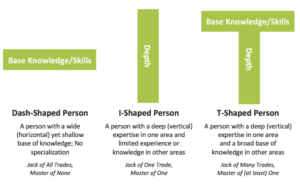Choosing between an MBA and specialized master’s program is a tricky decision—here’s what you need to know about each qualification.
Pursuing a graduate education is an investment and increases the chances of earning the next promotion. With hundreds of business schools offering a wide myriad of graduate programs, finding the ideal course for you can be challenging. Before you venture into specific schools and programs, you will need to answer one important question: Is an MBA or a specialized Master’s degree—such as a Master’s in Management, Human Resources, Marketing, or Finance—the right option for you?
Now that you are on the cusp of making your next move, you want to ensure it is in the right direction. Should you apply for a master’s degree or an MBA? You need to think about the field that inspires your intellectual curiosity—the one that you want to plunge into and make a difference in. It is about you in a world full of opportunities to learn and grow throughout your life.
MBA & Specialized Masters Defined
What is an MBA?
MBA stands for Master of Business Administration, and it is a general graduate business degree that teaches students technical, managerial, and leadership skills. There are multiple types of programs to choose from, including full-time, part-time, and executive MBA programs.
What is a specialized master’s degree?
A Master’s degree is an advanced graduate degree that shows a high level of mastery in a particular subject area. The fields of study can revolve around the Arts, Humanities, Healthcare, Natural Sciences, and more. Therefore, choosing the right program will allow students to boost both their knowledge and specific competencies.
MBA Vs Specialized Masters: 3 Important Differences
An MBA and a Master’s have clear distinctions with wide-ranging and far-reaching implications that can affect your chosen career path. It is of vital importance that one determines the personal need and use for a Master’s degree and an MBA degree before deciding to embark on that journey.

I-shaped (Specialized Masters) and or T-Shaped (MBA)
A Master’s degree is a specialised field and focuses on details. It covers a particular subject area and suits individuals who want to delve in-depth into their industry or wish to switch careers. Master’s degrees are used to gain technical skills in a chosen area of study and to develop you as an I-shaped executive that is characterized by a single specialty or area of expertise. They demonstrate limited general knowledge of different disciplines and prefer to work in one particular field. That is why they are depicted with the letter “I,” which represents their deep knowledge and experience in a single specialty or domain.
An MBA degree is more general in nature and focuses on the big picture. It covers a wide range of subject areas and suits individuals looking to advance their careers. MBA degrees help to develop you into T-shaped professionals. T-shaped professionals have vertical (specialized) skills but also horizontal (general) knowledge in other disciplines. This is in reference to having both their breadth and depth of experience. In comparison to I-shaped people (depicted by those with very narrow expertise), T-shaped people have broad skills across multiple fields of knowledge or discipline (the horizontal part of the T), but also deep expertise in one specialty or domain (the vertical piece).
Learning Theory vs Applied Knowledge

Source: Aventis Global Leadership Event
MBAs feature a more practical curriculum than specialized master’s programs. Students in the MBA program have more opportunities to interact with the business world in real life. One popular example of this learning approach is using case studies, where students are given real business issues and present their solutions directly to the company.
Meanwhile, specialized master’s programs encourage students to deepen their theoretical understanding in one specific area. Specialized Masters are suited for candidates who already have a very clear idea of where their interests lie.
Different Student Profiles

Aventis MBA Student Profile 2021/22
MBAs and specialized Master’s programs tend to attract slightly different participants. Most MBA programs require their students to have at least 5 years of executive experience behind them, while specialized Master’s programs can be studied right after a bachelor’s degree. The MBA is suitable for professionals from a diverse array of backgrounds, provided they have the right level of experience. Specialized Master’s programs tend to draw from a less varied pool of applicants in terms of academic background.
Conclusion

In conclusion, specialists with a Master’s degree are usually expected to utilise their in-depth knowledge to bring about a breakthrough and achieve a certain result. While MBAs attract seniors, they are usually expected to oversee and plan long-term goals and drive the business forward.
Indeed, we live in a world full of opportunities for learning and career development. Now that you know the difference between a Master’s degree and an MBA degree, based on your preference, you should build on the strategy that will take you where you will truly make a difference. At Aventis Graduate School, we offer an extensive suite of MBA and Specialized Masters programs such as Masters in Global HR Management, Masters in Data Analytics, and Masters in Psychology. These programs are tailored to meet the needs of different professionals from different backgrounds.